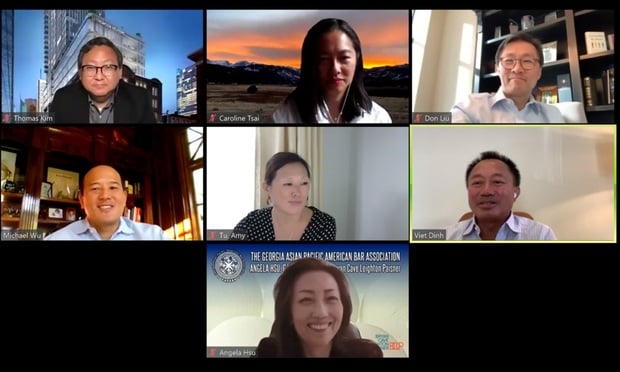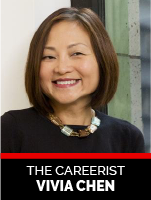'A Scary and Sad Time': Asian American GCs Talk About Current Racism
Somehow, I had a feeling this panel discussion would be different. And boy was it.
May 17, 2020 at 11:05 AM
4 minute read
The original version of this story was published on The American Lawyer
 A group of general counsel on a panel sponsored by the National Asian Pacific American Bar Association.
A group of general counsel on a panel sponsored by the National Asian Pacific American Bar Association.
I almost never cover panel discussions that dispense advice to lawyers on how to succeed, because they're usually so predictable. (How many times do you need to be told the importance of having a sponsor, learning the client's business and standing up straight?)
Somehow, though, I had a feeling this discussion would be different.
And boy was it.
Consisting of an all-star cast of Asian American general counsel at major companies—Don Liu of Target Corp., Amy Tu of Tyson Food Inc., Caroline Tsai of Western Union, Viet Dinh of Fox Corp., Michael Wu of Madewell Inc. and Thomas Kim of Thomson Reuters—most of the panelists on the Zoom conference sponsored by National Asian Pacific American Bar Association (NAPABA) were unusually frank, particularly about the current climate of racism.
As you probably know, Asians are getting battered during this pandemic. According to a new Ipsos survey conducted for the Center for Public Integrity, more than 30% of Americans have witnessed people of Asian descent getting blamed for the coronavirus pandemic. And just a few days ago, President Donald Trump, who's habitually called COVID-19 the "Chinese virus," added fuel to this issue when he told CBS News reporter Weijia Jiang to "ask China" when she confronted him on his response to a question about testing for the virus.
So how do these GCs take recent events on the Asian American community? Very personally.
"It's very frustrating," said Kim of Thomson Reuters. "As a media executive, we have to change the narrative for Asian Pacific Americans. We are the doctors and nurses on the front lines; we are the small business owners providing consumers with necessary items; we are the essential workers. But too often, the narrative is that we're the 'other.' "
 "It's a scary and sad time," said Tsai of Western Union. "I'm a proud American, but some people don't see me as American." That discrimination extends to her son, who, she said, was called "Ching Chong" by classmates. "As a mother, I was so worried, but he told me he used humor [to defuse the situation]."
"It's a scary and sad time," said Tsai of Western Union. "I'm a proud American, but some people don't see me as American." That discrimination extends to her son, who, she said, was called "Ching Chong" by classmates. "As a mother, I was so worried, but he told me he used humor [to defuse the situation]."
Like Tsai, Wu of Madewell, seemed stunned that his child is now experiencing the same type of bigotry he had decades ago in America. "In eighth grade in Georgia, I was called every derogatory term, and now my child has been on the receiving end of that same discrimination."
But of all the GCs at the discussion, Tu of Tyson was the most blunt: "I'm extremely disappointed in this country," she said upfront. "People who work in our community—which are a lot of immigrants, including Asians—are being discriminated against. They can't get served; they can't get a haircut. They're harassed." And she minced no words about the reason: "It's because of their race and what's happened in the media. It shows a failure of leadership."
(At this point, you might have noticed that several people on the panel complained about the media's vilification of Asians and other minorities. It would have been interesting if Dinh of Fox News, which has consistently called COVID-19 the "Chinese virus," had jumped in, but he steered clear. Dinh, however, did talk about how Fox safeguards its news staff: "We are purveyors of First Amendment activity." He added, "The information we bring is essential to the well-being and orderly running of our society, and we make sure that our news correspondents are safe.")
So what will make a difference in this current climate? Most seem to agree that Asian American GCs should not be silent. "Stand up, stand proud—but at a safe distance," said Kim. "We have a voice," added Tu. "And as general counsel, we can't turn a blind eye."
Target's Liu proposed another solution: Enlist a wide network of supporters. During one of Target's "listening sessions" that got quite emotional, recalled Liu, "one of the non-Asians said it should be us who steps in to make sure that our Asian American friends aren't discriminated."
They are all correct. Unfortunately, however, I think it's going to take a while until the narrative of Asian Americans as the latest bogeyman changes.
Contact Vivia Chen at [email protected]. On Twitter: @lawcareerist.
This content has been archived. It is available through our partners, LexisNexis® and Bloomberg Law.
To view this content, please continue to their sites.
Not a Lexis Subscriber?
Subscribe Now
Not a Bloomberg Law Subscriber?
Subscribe Now
NOT FOR REPRINT
© 2025 ALM Global, LLC, All Rights Reserved. Request academic re-use from www.copyright.com. All other uses, submit a request to [email protected]. For more information visit Asset & Logo Licensing.
You Might Like
View All
The Growing Antitrust Scrutiny of DraftKings and FanDuel

What Qualities Will Distinguish Good from Great Service In 2025?

Trending Stories
Who Got The Work
J. Brugh Lower of Gibbons has entered an appearance for industrial equipment supplier Devco Corporation in a pending trademark infringement lawsuit. The suit, accusing the defendant of selling knock-off Graco products, was filed Dec. 18 in New Jersey District Court by Rivkin Radler on behalf of Graco Inc. and Graco Minnesota. The case, assigned to U.S. District Judge Zahid N. Quraishi, is 3:24-cv-11294, Graco Inc. et al v. Devco Corporation.
Who Got The Work
Rebecca Maller-Stein and Kent A. Yalowitz of Arnold & Porter Kaye Scholer have entered their appearances for Hanaco Venture Capital and its executives, Lior Prosor and David Frankel, in a pending securities lawsuit. The action, filed on Dec. 24 in New York Southern District Court by Zell, Aron & Co. on behalf of Goldeneye Advisors, accuses the defendants of negligently and fraudulently managing the plaintiff's $1 million investment. The case, assigned to U.S. District Judge Vernon S. Broderick, is 1:24-cv-09918, Goldeneye Advisors, LLC v. Hanaco Venture Capital, Ltd. et al.
Who Got The Work
Attorneys from A&O Shearman has stepped in as defense counsel for Toronto-Dominion Bank and other defendants in a pending securities class action. The suit, filed Dec. 11 in New York Southern District Court by Bleichmar Fonti & Auld, accuses the defendants of concealing the bank's 'pervasive' deficiencies in regards to its compliance with the Bank Secrecy Act and the quality of its anti-money laundering controls. The case, assigned to U.S. District Judge Arun Subramanian, is 1:24-cv-09445, Gonzalez v. The Toronto-Dominion Bank et al.
Who Got The Work
Crown Castle International, a Pennsylvania company providing shared communications infrastructure, has turned to Luke D. Wolf of Gordon Rees Scully Mansukhani to fend off a pending breach-of-contract lawsuit. The court action, filed Nov. 25 in Michigan Eastern District Court by Hooper Hathaway PC on behalf of The Town Residences LLC, accuses Crown Castle of failing to transfer approximately $30,000 in utility payments from T-Mobile in breach of a roof-top lease and assignment agreement. The case, assigned to U.S. District Judge Susan K. Declercq, is 2:24-cv-13131, The Town Residences LLC v. T-Mobile US, Inc. et al.
Who Got The Work
Wilfred P. Coronato and Daniel M. Schwartz of McCarter & English have stepped in as defense counsel to Electrolux Home Products Inc. in a pending product liability lawsuit. The court action, filed Nov. 26 in New York Eastern District Court by Poulos Lopiccolo PC and Nagel Rice LLP on behalf of David Stern, alleges that the defendant's refrigerators’ drawers and shelving repeatedly break and fall apart within months after purchase. The case, assigned to U.S. District Judge Joan M. Azrack, is 2:24-cv-08204, Stern v. Electrolux Home Products, Inc.
Featured Firms
Law Offices of Gary Martin Hays & Associates, P.C.
(470) 294-1674
Law Offices of Mark E. Salomone
(857) 444-6468
Smith & Hassler
(713) 739-1250









